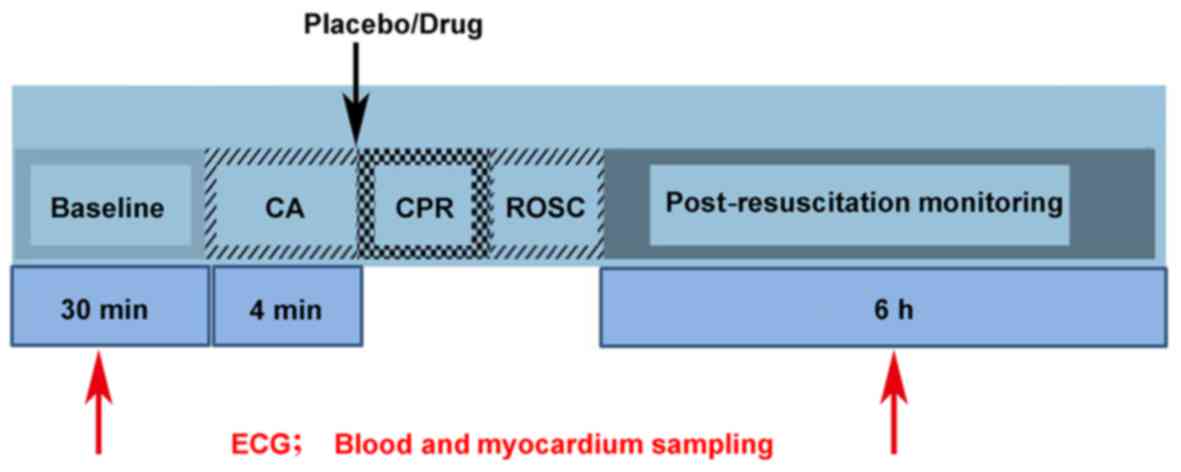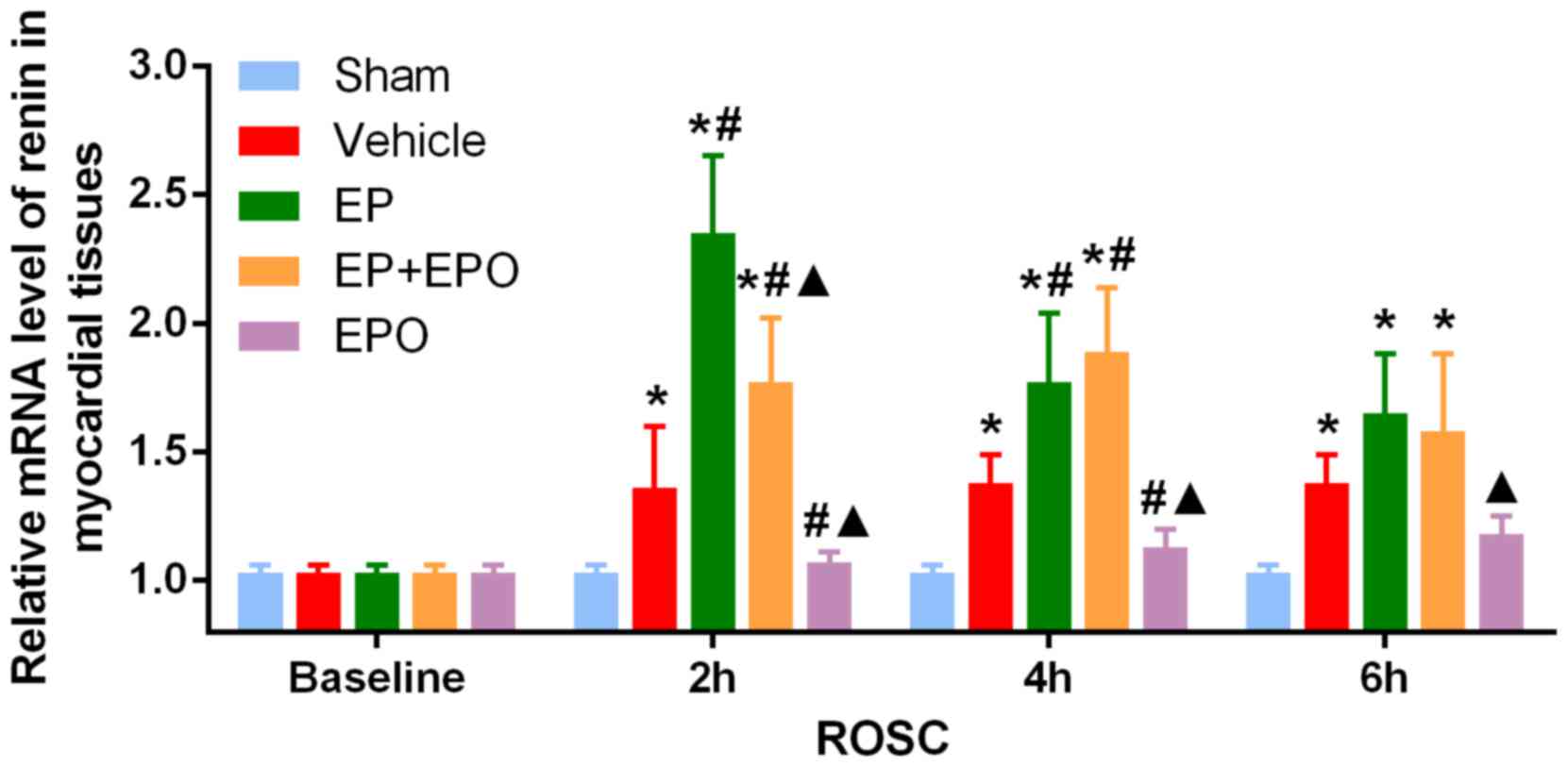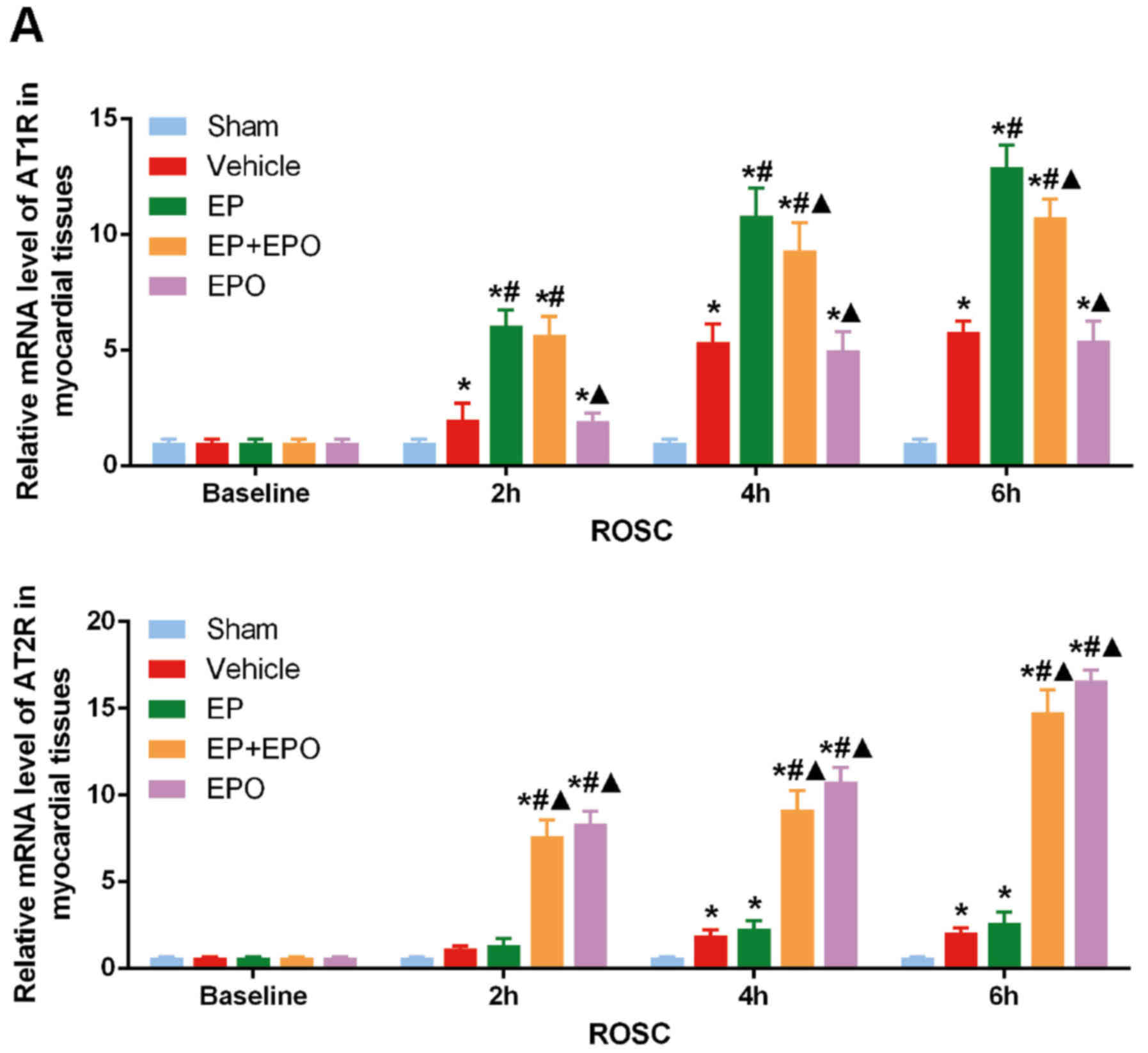|
1
|
Jentzer JC, Chonde MD and Dezfulian C:
Myocardial dysfunction and shock after cardiac arrest. Biomed Res
Int. 2015:3147962015. View Article : Google Scholar : PubMed/NCBI
|
|
2
|
Bougouin W and Cariou A: Management of
postcardiac arrest myocardial dysfunction. Curr Opin Crit Care.
19:195–201. 2013. View Article : Google Scholar : PubMed/NCBI
|
|
3
|
Rivers EP, Wortsman J, Rady MY, Blake HC,
McGeorge FT and Buderer NM: The effect of the total cumulative
epinephrine dose administered during human CPR on hemodynamic,
oxygen transport, and utilization variables in the
postresuscitation period. Chest. 106:1499–1507. 1994. View Article : Google Scholar : PubMed/NCBI
|
|
4
|
Wang G, Zhang Q, Yuan W, Wu J and Li C:
Sildenafil protects against myocardial ischemia-reperfusion injury
following cardiac arrest in a porcine model: Possible role of the
renin-angiotensin system. Int J Mol Sci. 16:27015–27031. 2015.
View Article : Google Scholar : PubMed/NCBI
|
|
5
|
Huang CH, Hsu CY, Chen HW, Tsai MS, Cheng
HJ, Chang CH, Lee YT and Chen WJ: Erythropoietin improves the
postresuscitation myocardial dysfunction and survival in the
asphyxia-induced cardiac arrest model. Shock. 28:53–58. 2007.
View Article : Google Scholar : PubMed/NCBI
|
|
6
|
Mollace V, Gliozzi M, Capuano A and Rossi
F: Modulation of RAAS-natriuretic peptides in the treatment of HF:
Old guys and newcomers. Int J Cardiol. 226:126–131. 2017.
View Article : Google Scholar : PubMed/NCBI
|
|
7
|
Inuzuka T, Fujioka Y, Tsuda M, Fujioka M,
Satoh AO, Horiuchi K, Nishide S, Nanbo A, Tanaka S and Ohba Y:
Attenuation of ligand-induced activation of angiotensin II type 1
receptor signaling by the type 2 receptor via protein kinase C. Sci
Rep. 6:216132016. View Article : Google Scholar : PubMed/NCBI
|
|
8
|
Kaschina E, Grzesiak A, Li J,
Foryst-Ludwig A, Timm M, Rompe F, Sommerfeld M, Kemnitz UR, Curato
C, Namsolleck P, et al: Angiotensin II type 2 receptor stimulation:
A novel option of therapeutic interference with the
renin-angiotensin system in myocardial infarction? Circulation.
118:2523–2532. 2008. View Article : Google Scholar : PubMed/NCBI
|
|
9
|
Borovnik-Lesjak V, Whitehouse K, Baetiong
A, Artin B, Radhakrishnan J and Gazmuri RJ: High-dose
erythropoietin during cardiac resuscitation lessens
postresuscitation myocardial stunning in swine. Transl Res.
162:110–121. 2013. View Article : Google Scholar : PubMed/NCBI
|
|
10
|
Nandra KK, Collino M, Rogazzo M, Fantozzi
R, Patel NS and Thiemermann C: Pharmacological preconditioning with
erythropoietin attenuates the organ injury and dysfunction induced
in a rat model of hemorrhagic shock. Dis Model Mech. 6:701–709.
2013. View Article : Google Scholar : PubMed/NCBI
|
|
11
|
Sanchis-Gomar F, Garcia-Gimenez JL,
Pareja-Galeano H, Romagnoli M, Perez-Quilis C and Lippi G:
Erythropoietin and the heart: Physiological effects and the
therapeutic perspective. Int J Cardiol. 171:116–125. 2014.
View Article : Google Scholar : PubMed/NCBI
|
|
12
|
Jie KE, Verhaar MC, Cramer MJ, van der
Putten K, Gaillard CA, Doevendans PA, Koomans HA, Joles JA and
Braam B: Erythropoietin and the cardiorenal syndrome: Cellular
mechanisms on the cardiorenal connectors. Am J Physiol Renal
Physiol. 291:F932–F944. 2006. View Article : Google Scholar : PubMed/NCBI
|
|
13
|
Rosario R and Epstein M: Relationship
between erythropoietin administration and alterations of
renin-angiotensin-aldosterone. J Renin Angiotensin Aldosterone
Syst. 7:135–138. 2006. View Article : Google Scholar : PubMed/NCBI
|
|
14
|
Lundby C, Thomsen JJ, Boushel R, Koskolou
M, Warberg J, Calbet JA and Robach P: Erythropoietin treatment
elevates haemoglobin concentration by increasing red cell volume
and depressing plasma volume. J Physiol. 578:309–314. 2007.
View Article : Google Scholar : PubMed/NCBI
|
|
15
|
Cho A and Seok SH: Ethical guidelines for
use of experimental animals in biomedical research. J Bacteriol
Virol. 43:18–26. 2013. View Article : Google Scholar
|
|
16
|
de Prost N, Ricard JD, Saumon G and
Dreyfuss D: Ventilator-induced lung injury: Historical perspectives
and clinical implications. Ann Intensive Care. 1:282011. View Article : Google Scholar : PubMed/NCBI
|
|
17
|
Wang P, Yao L, Zhou LL, Liu YS, Chen MD,
Wu HD, Chang RM, Li Y, Zhou MG, Fang XS, et al: Carbon monoxide
improves neurologic outcomes by mitochondrial biogenesis after
global cerebral ischemia induced by cardiac arrest in rats. Int J
Biol Sci. 12:1000–1009. 2016. View Article : Google Scholar : PubMed/NCBI
|
|
18
|
Livak KJ and Schmittgen TD: Analysis of
relative gene expression data using real-time quantitative PCR and
the 2(-Delta Delta C(T)) method. Methods. 25:402–408. 2001.
View Article : Google Scholar : PubMed/NCBI
|
|
19
|
Mongardon N, Dumas F, Ricome S, Grimaldi
D, Hissem T, Pène F and Cariou A: Postcardiac arrest syndrome: From
immediate resuscitation to long-term outcome. Ann Intensive Care.
1:452011. View Article : Google Scholar : PubMed/NCBI
|
|
20
|
Lemiale V, Dumas F, Mongardon N,
Giovanetti O, Charpentier J, Chiche JD, Carli P, Mira JP, Nolan J
and Cariou A: Intensive care unit mortality after cardiac arrest:
The relative contribution of shock and brain injury in a large
cohort. Intensive Care Med. 39:1972–1980. 2013. View Article : Google Scholar : PubMed/NCBI
|
|
21
|
Zablocki D and Sadoshima J: Angiotensin II
and oxidative stress in the failing heart. Antioxid Redox Signal.
19:1095–1109. 2013. View Article : Google Scholar : PubMed/NCBI
|
|
22
|
Zreikat HH, Harpe SE, Slattum PW, Mays DP,
Essah PA and Cheang KI: Effect of Renin-Angiotensin system
inhibition on cardiovascular events in older hypertensive patients
with metabolic syndrome. Metabolism. 63:392–399. 2014. View Article : Google Scholar : PubMed/NCBI
|
|
23
|
Sanam K, Bhatia V, Bajaj NS, Gaba S,
Morgan CJ, Fonarow GC, Butler J, Deedwania P, Prabhu SD, Wu WC, et
al: Renin-Angiotensin system inhibition and lower 30-day all-cause
readmission in medicare beneficiaries with heart failure. Am J Med.
129:1067–1073. 2016. View Article : Google Scholar : PubMed/NCBI
|
|
24
|
Wang X, Yuan B, Dong W, Yang B, Yang Y,
Lin X and Gong G: Humid heat exposure induced oxidative stress and
apoptosis in cardiomyocytes through the angiotensin II signaling
pathway. Heart Vessels. 30:396–405. 2015. View Article : Google Scholar : PubMed/NCBI
|
|
25
|
Zhang YH: Neuronal nitric oxide synthase
in hypertension - an update. Clin Hypertens. 22:202016. View Article : Google Scholar : PubMed/NCBI
|
|
26
|
Lin L, Liu X, Xu J, Weng L, Ren J, Ge J
and Zou Y: High-density lipoprotein inhibits mechanical
stress-induced cardiomyocyte autophagy and cardiac hypertrophy
through angiotensin II type 1 receptor-mediated PI3K/Akt pathway. J
Cell Mol Med. 19:1929–1938. 2015. View Article : Google Scholar : PubMed/NCBI
|
|
27
|
Strohmenger HU, Lindner KH, Wienen W and
Vogt J: Effects of the AT1-selective angiotensin II antagonist,
telmisartan, on hemodynamics and ventricular function after
cardiopulmonary resuscitation in pigs. Resuscitation. 35:61–68.
1997. View Article : Google Scholar : PubMed/NCBI
|
|
28
|
Kaschina E, Lauer D, Schmerler P, Unger T
and Steckelings UM: AT2 receptors targeting cardiac protection
post-myocardial infarction. Curr Hypertens Rep. 16:4412014.
View Article : Google Scholar : PubMed/NCBI
|
|
29
|
Xu J, Sun Y, Carretero OA, Zhu L, Harding
P, Shesely EG, Dai X, Rhaleb NE, Peterson E and Yang XP: Effects of
cardiac overexpression of the angiotensin II type 2 receptor on
remodeling and dysfunction in mice post-myocardial infarction.
Hypertension. 63:1251–1259. 2014. View Article : Google Scholar : PubMed/NCBI
|
|
30
|
Xiao HL, Li CS, Zhao LX, Yang J, Tong N,
An L and Liu QT: Captopril improves postresuscitation hemodynamics
protective against pulmonary embolism by activating the ACE2/Ang-
(1–7)/Mas axis. Naunyn Schmiedebergs Arch Pharmacol. 389:1159–1169.
2016. View Article : Google Scholar : PubMed/NCBI
|
|
31
|
Sutherland BA, Minnerup J, Balami JS, Arba
F, Buchan AM and Kleinschnitz C: Neuroprotection for ischaemic
stroke: Translation from the bench to the bedside. Int J Stroke.
7:407–418. 2012. View Article : Google Scholar : PubMed/NCBI
|
|
32
|
Ahmet I, Tae HJ, Juhaszova M, Riordon DR,
Boheler KR, Sollott SJ, Brines M, Cerami A, Lakatta EG and Talan
MI: A small nonerythropoietic helix B surface peptide based upon
erythropoietin structure is cardioprotective against ischemic
myocardial damage. Mol Med. 17:194–200. 2011. View Article : Google Scholar : PubMed/NCBI
|
|
33
|
Najjar SS, Rao SV, Melloni C, Raman SV,
Povsic TJ, Melton L, Barsness GW, Prather K, Heitner JF, Kilaru R,
et al: Intravenous erythropoietin in patients with ST-segment
elevation myocardial infarction: REVEAL: A randomized controlled
trial. JAMA. 305:1863–1872. 2011. View Article : Google Scholar : PubMed/NCBI
|
|
34
|
Calò LA, Davis PA, Maiolino G, Pagnin E,
Ravarotto V, Naso E, Carraro G and Naso A: Assessing the
relationship of angiotensin II Type 1 receptors with erythropoietin
in a human model of endogenous angiotensin II Type 1 receptor
antagonism. Cardiorenal Med. 6:16–24. 2015. View Article : Google Scholar : PubMed/NCBI
|
|
35
|
Ahles A and Engelhardt S: Polymorphic
variants of adrenoceptors: Pharmacology, physiology, and role in
disease. Pharmacol Rev. 66:598–637. 2014. View Article : Google Scholar : PubMed/NCBI
|
|
36
|
Broadley KJ and Penson PE: The roles of
alpha- and beta-adrenoceptor stimulation in myocardial ischaemia.
Auton Autacoid Pharmacol. 24:87–93. 2004. View Article : Google Scholar : PubMed/NCBI
|

















